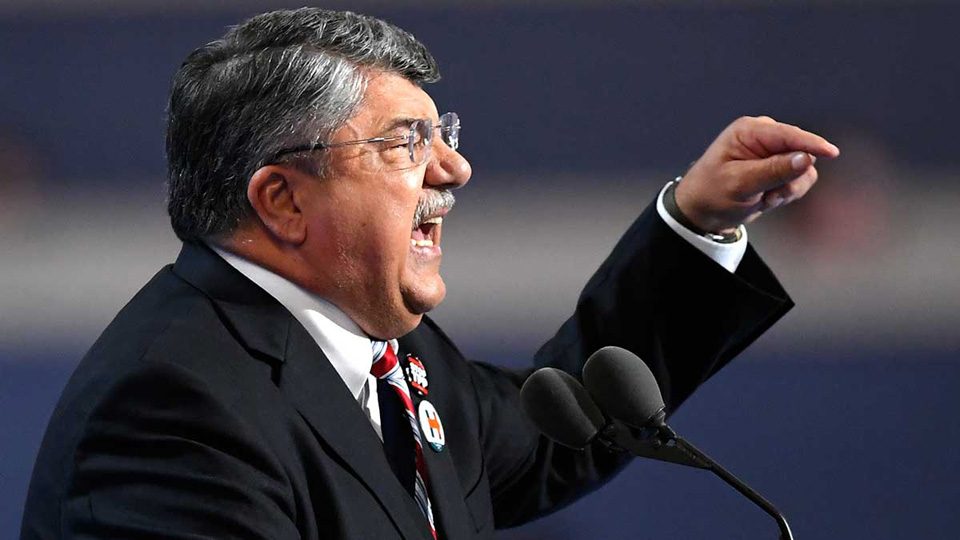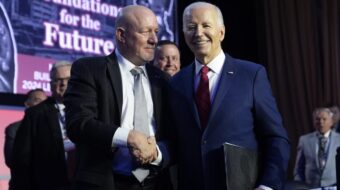
Unions and consumer groups blasted Republican President Donald Trump for yanking a Labor Department rule that protected workers’ investments by ordering investment advisers – stockbrokers and the like – to put their clients’ interests first.
The fiduciary rule was one of several such rules Trump ordered recalled on Feb. 3. His combined actions were so broad and so threatening to the Dodd-Frank Act, the financial reform enacted in the wake of the financier-caused Great Recession, that one writer described the whole package as “putting the fox in charge of the hen house.”
And AFL-CIO President Richard Trumka said that, taken together, Trump’s moves would “allow Wall Street to get away with murder.”
The Labor Department’s fiduciary rule is of particular interest to workers, as individual workers, retirees and/or union pension funds have often found themselves at the mercy of brokers who touted investments that benefited the brokers rather than their clients.
Echoing the complaints of right wing congressional Republicans, Trump told DOL “to examine the fiduciary duty rule to determine whether it may adversely affect the ability of Americans to gain access to retirement information and financial advice.” Neither Trump nor GOP lawmakers ever offered hard data showing the rule would reduce access to advice.
But Trump made it clear he wants the rule yanked. DOL’s rule “may significantly alter the manner in which Americans can receive financial advice, and may not be consistent with the policies of my administration,” he said.
Yanking the rule, though, is not consistent with the interests of workers, who lost $2 trillion due to investment firms’ financial finagling, AFL-CIO President Richard Trumka retorted.
“Our retirement savings evaporated overnight. The dreams of those who had worked hard for years were destroyed by Wall Street gambling. And out-of-touch corporatists played a game of craps with our hard-earned savings,” he said.
“These executive orders threaten to take us back to those dark days. Working people made clear in this election that we need to rewrite the rules of the economy to benefit all of us, not just the suits on Wall Street…Picking apart Dodd-Frank” – the post-crash law that reined in the investment industry – “and allowing financial advisers to scam retirees encourages the ugliest Wall Street behaviors that led to the financial crisis.
“This is a huge gift to those who already have an outsized share of the wealth workers created with our bare hands. Working people and retirees have paid too much already. Doing away with these regulations will allow Wall Street to get away with murder,” he concluded.
The National Consumers League wasn’t happy, either.
“The fiduciary rule is a common-sense consumer protection that requires the professionals who are in charge of consumers’ savings to act in the ‘best interests of their clients,’” NCL Executive Director Sally Greenberg said. “Without this rule, retirement advisors will be free to ignore conflicts of interest and make decisions that benefit their firms’ bottom lines, not the financial security of millions of Americans.”
Congressional Republicans, as might be expected, cheered. House Education and the Workforce Committee Chair Virginia Foxx, R-N.C., called Trump’s move “necessary and appropriate” against “a devastating regulation.” Panel member Joe Wilson, R-S.C., introduced legislation to delay any fiduciary rule for two years. DOL’s rule was scheduled to start April 10.
Acting Labor Secretary Ed Hugler took a dispassionate position. “The Department of Labor will now consider its legal options to delay the applicability date” of the fiduciary rule “as we comply with the president’s memorandum,” Hugler said.

MOST POPULAR TODAY

Hold the communism, please: SFMOMA’s Diego Rivera exhibit downplays artist’s radical politics

‘Warning! This product supports genocide’: Michigan group aims to educate consumers

After months of denial, U.S. admits to running Ukraine biolabs

Ohio: Franklin County treasurer attends Netanyahu meeting, steps up Israel Bond purchases

“Trail of Tears Walk” commemorates Native Americans’ forced removal






Comments